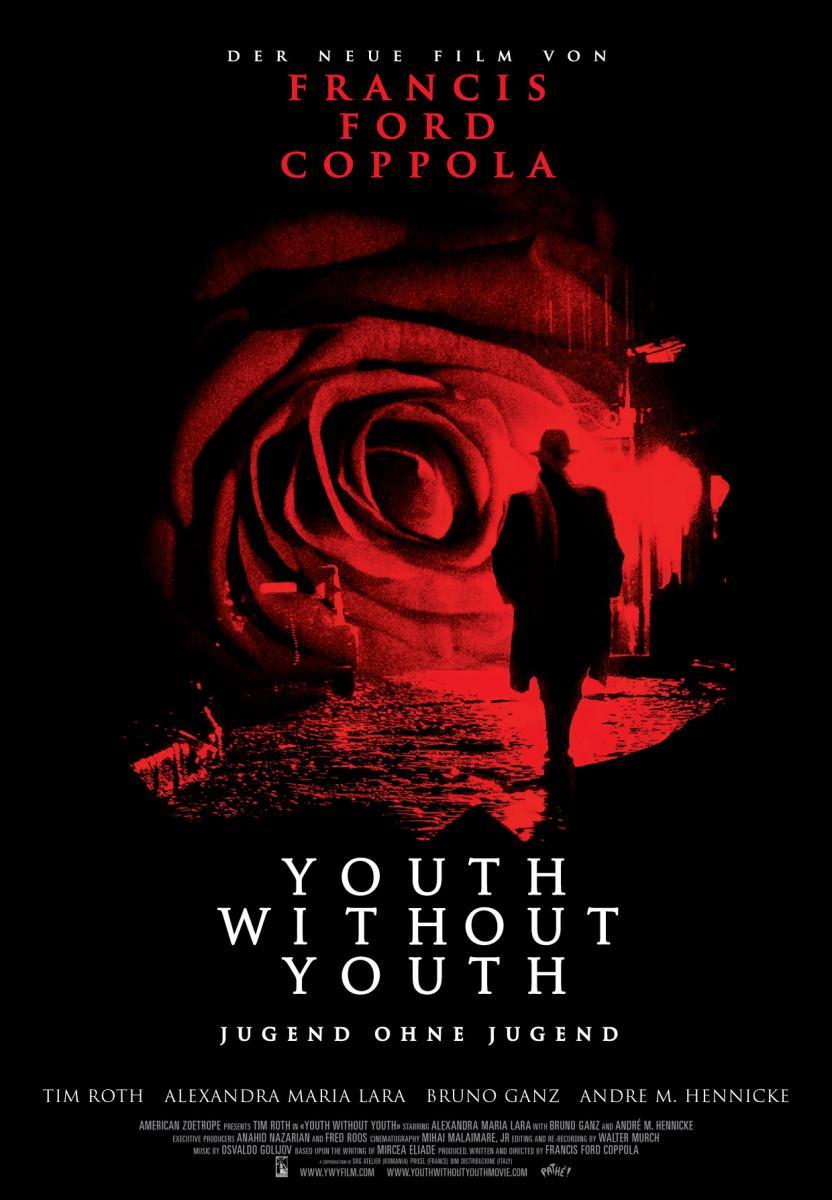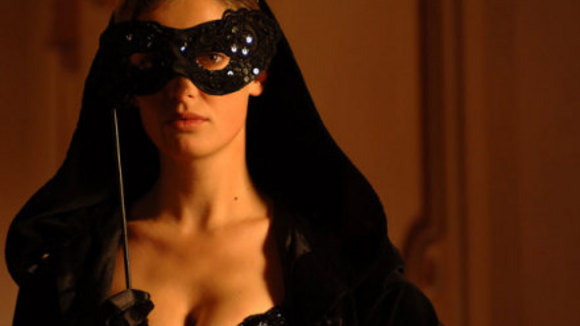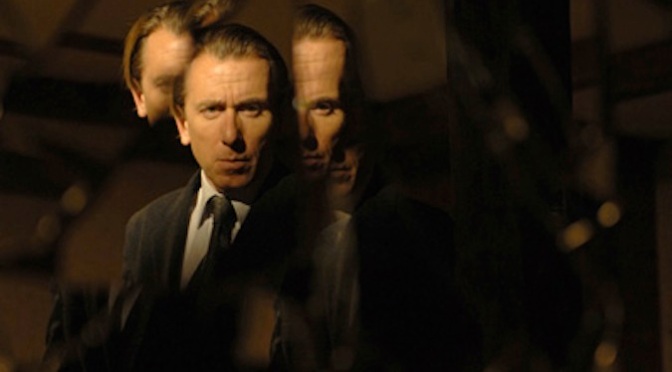 |
| From https://pics.filmaffinity.com/ Youth_Without_Youth-959559384-large.jpg |
Director: Francis Ford Coppola
Screenplay: Francis Ford Coppola
Based on the Novel by Mircea
Eliade
Cast: Tim Roth as Dominic Matei; Alexandra
Maria Lara as Laura/ Veronica; Bruno Ganz as Professor Stanciulescu; André
Hennicke as Josef Rudolf; Marcel Iureș as Professor Giuseppe Tucci; Adrian
Pintea as Pandit
 Youth Without Youth is an odd film, I won't deny it. Admittedly
adapted from a novel by Mircea Eliade,
a lot of this curious premise - in which an old lecturer Dominic Matei (Tim Roth) is hit by lightning grows
young, can read books by merely looking at time, and becomes a superhuman
intelligence - is likely from there, something I will get into later. As much
of it though is knowing Francis Ford
Coppola made the film without compromise, wrote the film clearly with no
compromise and will shot the material like a boss.
Youth Without Youth is an odd film, I won't deny it. Admittedly
adapted from a novel by Mircea Eliade,
a lot of this curious premise - in which an old lecturer Dominic Matei (Tim Roth) is hit by lightning grows
young, can read books by merely looking at time, and becomes a superhuman
intelligence - is likely from there, something I will get into later. As much
of it though is knowing Francis Ford
Coppola made the film without compromise, wrote the film clearly with no
compromise and will shot the material like a boss.
He's not made a film since Twixt (2011)1, part of a
trilogy not connected together barring the fact that, returning to cinema
briefly, the legendary director of the Godfather
trilogy made three films on his own whims having spent over ten years away
tending his winery - Tetro (2009) and
Twixt, the later an odd experience
meant to be a horror film co-edited by viewers but becoming a 3D horror film
where Val Kilmer occasionally talks
to the ghost of Edgar Allen Poe, were idiosyncratic to say the least, but Youth Without Youth was a sudden return
which referenced back to both his virtues and his notoriety of being obsessed
with making distinct films.
Starting under Roger Corman and a string of films by
the end of the sixties to find his own voice, his career reached its peak in
the seventies, not only with the incredible success of the first two Godfather films but The Conversation (1974), before
finishing the decade with Apocalypse Now
(1979), famously the Vietnam War adaptation of Hearts of Darkness that
turned into a warzone on set in its chaos. It's only into the eighties where,
while he'd make highly regarded films like One
From the Heart (1981) and Rumble
Fish (1983), his star started to falter in terms of One from the Heart's disastrous box office success forcing him to
have to spend the rest of the eighties recouping its cost. In fact into the
early nineties, economic reasons was one of the reasons the divisive third Godfather film was even made, thought
at least he also made making Bram Stoker's
Dracula (1992), which I'll defend barring Keanu Reeves trying an English accent.
 |
| From https://www.cinemaclock.com/images/580x326/77/ youth_without_youth__2007_1179.jpg |
By the end of the nineties, whilst The Rainmaker (1997) was more of a John Grisham adaptation than a Coppola film, the Robin Williams family film Jack (1996) was considered a nadir. Returning in 2007, Coppola made both a luscious and frankly bug nuts film, as in Roth plays a man whom as if given a second chance of life, grows young through the thunderbolt of youth, exploring the history of human language, and human intelligence in general, whilst in the midst of Nazi occupied Austria finding himself eyed by Nazis wanting to make superman from his example. Having lost of the love of his life years ago, she'll eventually return as Veronica (Alexandra Maria Lara), almost reincarnated and also hit by lightning, becoming a conduit for ancient female Buddhists and souls that regress to her physical ailment to the beginning of human communication.
It's a difficult film in them to
unpack, its source material clearly belonging to magical realism which
intermingled World War II drama, a drama about linguistics, romance and
tragedy, all alongside an ending which seems like it's going to cop out and say
it's all a dream, which it might've all been still, but plays more like a
circular story of a man's life that is from an entirely different era of cinema
than the 2000s. It's a film, bluntly, where you need to accept the premise entirely
or you'd hate it. The first half, set in WWII Romania does calmly take you
through the premise, in which the late Bruno
Ganz is a doctor fascinated by him during his treatment for the lightning
strike, showing slowly the curious abilities and quirks Roth's characters has acquired. The second half onwards however,
when it jumps in time over decades with Veronica possessed by spirits,
excursions to Buddhist tombs in other countries and a random cameo by Matt Damon, is a further leap to go
with. The notable thing is that the source novella author Mircea Eliade, from Romania, was a historian of religion, fiction
writer, philosopher, and professor at the University of Chicago who wrote about
the concept of the religious experience and was, befittingly, fluent in
multiple languages. Naturally for someone who wrote fiction and non-fiction
work equally, his source material if Youth
Without Youth is accurate is a very idiosyncratic work nourished by the
kind of esoteric subject matter Eliade
studied in his life. Its however subject matter that is an acquired taste for a
larger audience, so you as an audience have to come to this particular
adaptation with this in mind.
Coppola, mind, has always shot his films with an incredible scale, which
can seesaw in terms of the content between the elegant to the opposite spectrum
of the hallucinogenic. Both sides are felt with Youth Without Youth, a lush
period film which transitions from WWII Romania to over the next few decades to
the seventies, all with the tone of a classic period drama. It's a scale appropriate
for a film where the film gets surreal, like Tim Roth having a doppelganger he can talk to in both mirrors and
his dreams, Coppola really qualifing
as deserving the term "cinematic" with his work. It works with Youth Without Youth, the one virtue to
take from it that at least its logic makes sense because the world is built
enough to make it acceptable. It effectively takes a film like The English Patient (1996), the same
period war drama with English speaking actors in exotic locals, but imagines if Ralph Fiennes had psychic powers. The supernatural content has
deeper themes however, which is why it still works - Roth, good in the lead, eventually finding himself asking whether
his obsession is worth the sacrifice, finding himself also becoming obsessed in
the Atomic Age that nukes are going to destroy the world, all whilst his
doppelganger argues it's a necessary for the evolution of super humans to take
place.
Does Youth Without Youth work? For myself yes, as a curious hybrid. It
is, for obvious reasons, very esoteric and wouldn't have won over casual fans
of Francis Ford Coppola's work. It is
however clearly made by a man who didn't need to get back into the director's
seat and, when he decided to, was because he wanted to make this film and as
good as possible. As mentioned, he'd make two more films in this unofficial
trilogy, none of them connected in the slightest in terms of style or subject
matter, but in terms of a director having a short burst of creativity between
2007-2011 where he was still being experimental, Tetro still (as a drama starring Vincent Gallo) with a bold monochrome look and tone having a
boldness alongside Youth Without Youth and
Twixt. Whilst Youth Without Youth is not abstract, it's certainly engaging.
Abstract Spectrum: Magical Realism/Surreal
Abstract Rating (High/Medium/Low/None): None
 |
| From https://motionstatereview.files.wordpress.com/ 2014/09/photo_38.jpg?w=672&h=372&crop=1 |
=======
1) Well, there is an
ongoing film project named Distant
Vision, which I didn't know about until this review, which has had
"proof of concept" screenings at two American education institutions
between 2015 and 2015.
No comments:
Post a Comment